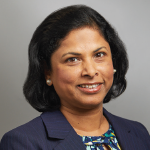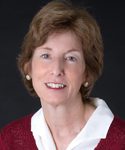
Dr. Chowdhary
“It really brought home to me this issue of access, especially for people who are uninsured,” Dr. Buckley says.
The CSHHC is a critical resource for our community in other ways as well, says Lisa G. Suter, MD, professor (rheumatology) and vice chair for diversity, equity and inclusion in the Section of Rheumatology, Allergy and Immunology at YSM.
“Healthcare disparities are influenced by many social determinants of health—insurance and transportation access to name two—and often arise from the ways systemic racism impacts our healthcare system and society,” says Dr. Suter. “By seeing the patient as a whole person and reflecting upon the community in which the patient lives, the Cornell Scott Hill Health Center helps reduce disparities in clinical outcomes. Not only does it rally resources to address patients’ limited transportation or insurance, but the clinic has a diverse staff, ensuring patients are more likely to see similar faces when they meet with their clinician. The clinic also is an active leader in the community, including COVID-19 vaccination efforts.”
Bottom Line
Working alongside a team of nurses, physician assistants, nurse practitioners and other specialists from CSHHC creates a camaraderie that helps Dr. Buckley cope with challenging cases, she says. “I think the personal relationships among the healthcare providers, the nurses and doctors who know each other really well, is a good thing. It creates bonds that are very good for the patients as well as the people who work there.” Also, nursing staff are adept in assisting uninsured patients obtain certain biologic therapy through patient assistance programs.
As she has matured in her career, Dr. Buckley has learned to accept that she cannot cure all of her patients, especially people who are medically underserved and have limited resources.
“Rheumatologists can do so much more to control rheumatic diseases like rheumatoid arthritis and lupus than they could at the beginning of my career, but sometimes we care for patients with serious inflammatory illnesses whose social and financial situations prevent them from receiving the right treatment at the right time,” she says. “The trainees struggle with this, as do the faculty, but after years of caring for people coming from all walks of life, we know that we’re not going to get every patient to the best outcome,” Dr. Buckley says.
“Community health centers are so important because they offer accessibility and the wrap-around services that allow us to get the best care possible to more people early in their illness.”
